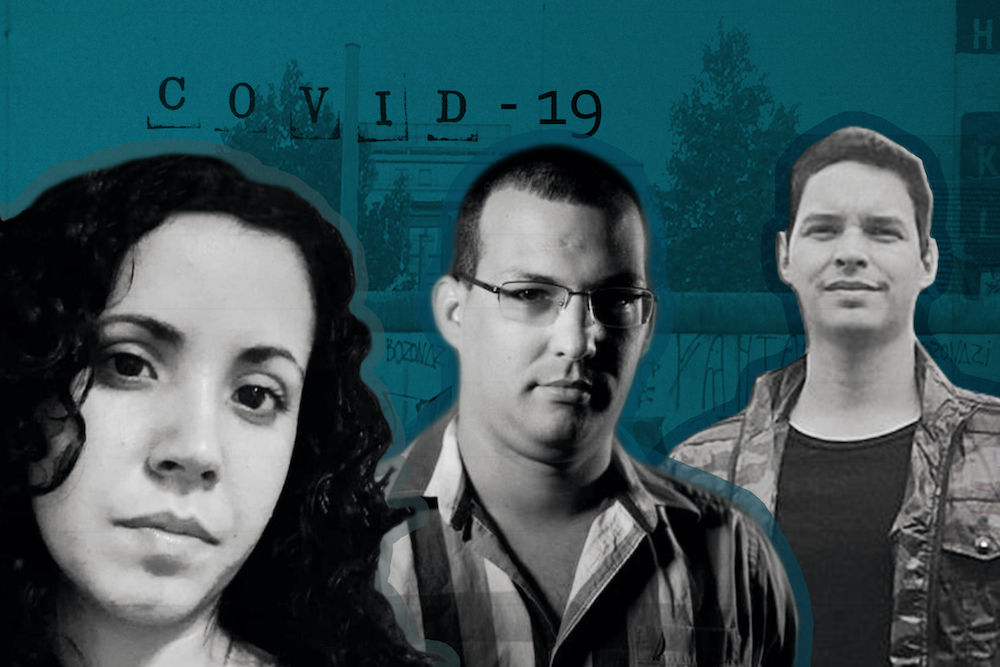In little more than 10 days, and disregarding the recommendations for isolation issued to the population to prevent the coronavirus from spreading further in Cuba, State Security has summoned and threatened several independent journalists: Yoe Suárez and Waldo Fernández Cuenca, with the DIARIO DE CUBA; and Camila Acosta and Julio Antonio Aleaga, of Cubanet.
As is often the case, family members were also the targets of threats. In the case of Yoe Suárez, an officer identifying himself as "Captain Jorge", the purported second-in-command of Counterintelligence for the Press, warned him that "the State Prosecutor and Minors may intervene against him", insinuating the that he may be deprived of custody of his two-year-old son. The journalist's mother was also summoned, interrogated and threatened with the consequences that her son could suffer.
Leidys Despaigne Barrero, Julio Antonio Aleaga's wife and a mother nursing an 11-month-old baby, was threatened with deportation to Santiago de Cuba, despite being legally domiciled in the capital, as she is married there. The aim of the intimidation, which Despaigne Barrero has suffered since 2017, is for her to pressure her husband to desist from his journalistic work.
All this is common territory for journalists, opponents and activists. One cannot really say it is any worse right now. Actually, this is a time that State Security could take advantage of to ease up; live and let live, or at least refrain from harassment. Why does it not do so?
The coronavirus is the perfect pretext to restrict peoples' liberties. Now it is not necessary to inform anyone when they cross the border at the airport and enter the country, that they cannot leave it; nor is it necessary to detain anyone on the way to the airport and hold them until they miss their flight. Now it is not just the opposition, activists and independent journalists who cannot travel, but the entire Cuban populace, and there is a good reason for this restriction: the pandemic.
Now, if any journalist, activist, or dissident decides to brave the virus and go out to perpetrate the dangerous "counter-revolutionary activity" of apprising themselves of what is happening, or even just trying to get food, police officers may, conveniently, order them to remain at home, on grounds that are a veritable godsend: the coronavirus.
They no longer need to threaten to accuse them of spreading fake news. Now there is a new and almost irrefutable charge: spreading the epidemic. But, by forcing them to emerge from isolation to obey a summons issued by State Security, the officers are not only endangering those summoned, but all those they come across on the way to the police station, and those who live with them. In other words, it is the State Security agents themselves who are perpetrating the crime of spreading the epidemic, when it would be able to keep their targets uncomfortable right inside their homes.
There could be a kind of truce, thanks to the pandemic. Why doesn't State Security take advantage of this? Why the aggressive stance? Though the Cuban Government scorns even the UN, why continue to spark criticism that continues to, slowly and relentlessly, undermine its credibility around the world, even with people on the left?
In May 2018 DIARIO DE CUBA had access to documents used by the Armed Forces during the 2016 Bastion military exercises, according to which independent journalists were to be the first target to neutralize in the event of massive protests against the government. Is this what State Security has slated for the current circumstances?
The many police officers on the streets, who, judging by the photos of lines to buy food and hygiene products, do not seem charged with ensuring that people keep their distance from each other, is reminiscent of the deployment that followed Hurricane Irma in 2017.
At that time, there were protests across Cuba– in Diez de Octubre, Havana, Carlos Rojas, Matanzas, Morón, and Ciego de Ávila– over the state's slow restoration of basic services.
A lack of water is one of the problems that people in many areas of the country must grapple with. In February 2020, before the coronavirus reached Cuba, residents of Zulueta and Corrales in Old Havana blocked off the streets to demand that the government provide them with drinking water. What could happen now that having water could be a life-or-death matter?
There was already a serious shortage of hygiene products before the coronavirus hit Cuba. If getting soap and detergent before was a question of smelling good, or at least civilized; or being able to maintain a food service business, where hygiene is crucial, now it is a matter of not smelling like a corpse.
If the choice used to be between standing in line for hours to buy food, or starving, now it is a matter of choosing between being killed by the coronavirus, or hunger. You cannot quarantine yourself with an empty refrigerator. You can catch it in a line; sitting at home, you can starve.
If in the months prior to the outbreak of the coronavirus around the world Cuba was going through a crisis very similar to the "Special Period" of the 90s, the end of which has never been officially decreed, what could happen in the country now, with an epidemic; a scarcity of food, water and hygiene products, no tourism, remittances, and with many people not able to work?
What could happen? Nothing, perhaps. Over the course of six decades the Cuban people have shown more apathy, indolence and capitulation than the courage to fight for their freedom and rights. The Cuban government has counted on this thus far, but everything could change. The authorities know this, and fear it. If they cannot avert a major revolt, they will at least try to do damage control – which, in this case, means preventing independent journalists from publishing an article like this one.
